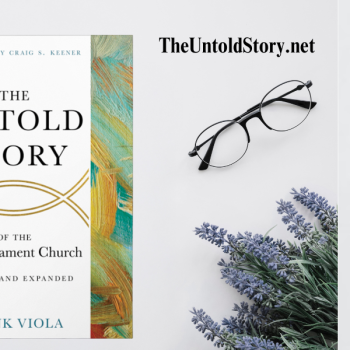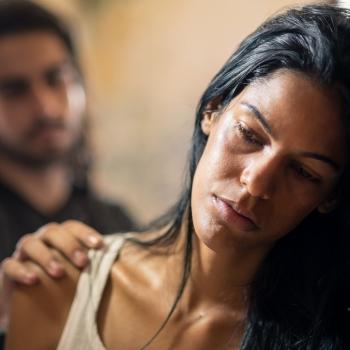We have never understood. We have never been faithful. We are constantly alert to sexual cues, and we think erotica is somehow sophisticated but we daily manage to miss the Divine Lovemaking that is constantly offered to us. The strain of our brokenness still runs rampant throughout the Church, throughout society, throughout our families, and within our deepest selves.
He sends His angels to hand-deliver the invitation to His Chamber, and the angels say, over and over, "Do not be afraid," and yet we hang back, in fear. He sends His Holy Spirit to whisper at us, incessantly, "Draw near, come closer," and we tune it out with politics and instrumentation and facsimiles of love. He Incarnates and speaks clearly, "Come to me, all of you . . . I am the Door. I am the Vine. I am the Way. I am the Water. I am the Bread that feeds the multitudes."
In Holy Communion, he speaks the spousal words of love: "My flesh is for you; for the life of the world. This is my Body." He sings the Song of Songs:
Open to me, my bride, my love, my dove, my undefiled: for my head is filled with dew, and my locks with the drops of the night. I have put off my garment; how can I put it on? I have washed my feet; how shall I defile them?
And still, with all of that romance, with all of that tenderness, we turn, and turn away, distracting ourselves as quickly as we can.
He makes the spousal promise: If you remain in me and my words remain in you, ask whatever you wish, and it will be given you.
It is a promise, from a God who always keeps His promises, from a loving spouse who cannot do enough for us. And still, we find it so difficult to engage, and nearly impossible to trust.
This is the Greatest Paradox in a God who Is many paradoxes: It is only by surrendering what is broken within us, and that is trust, can we once again have trust.
Whole trust, unreserved trust is what resides within His Majesty, but we do not trust Him back. We did not trust in Eden, which is why we fell, and why we hid ourselves. But we cannot be whole, or wholly His, unless we give him that broken trust, by trusting Him.
What God is like this God? O Come, Divine Messiah. Come, Your Majesty. O Come, O Come, Emmanuel, "God With Us" and ransom us; we are captives to our distrust. We are daily Isra-El, who struggles with God.
Advent is drawing us away from the world, and closer to the deepest of mysteries; the season of the Incarnate Word draws near. Let us draw near to Him, then. Let us slouch toward Bethlehem, carrying the poor gifts of our selves. Let us bow down in worship, and place before Him the thing of which we are most protective, because it is so very fragile: the trust of our own tender hearts.
Let us lay down our trust. Love is good. God is good. Let us allow His Love.
And then, we may Rejoice. Rejoice.





